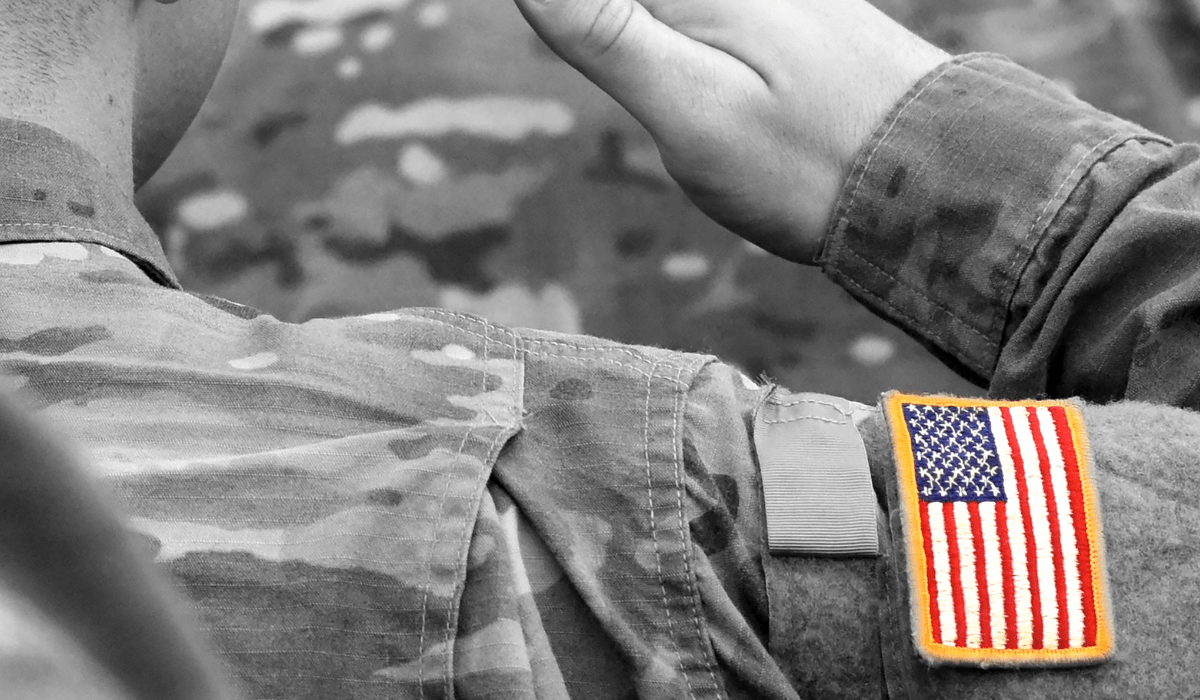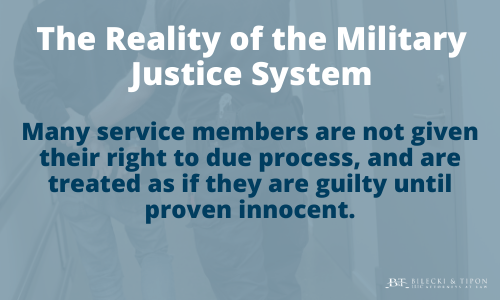
Can you receive a credit off of your sentence because your command illegally punished you prior to trial?
This is a frequent question we receive at Bilecki Law Group and that answer always depends on the application of the specific facts of your case to the often complex law in this area. In an ideal world, a service member’s chain of command would actually presume him or her innocent unless and until guilt has been proven beyond a reasonable doubt.
The reality, however, is that many service members are treated as if they are guilty until proven innocent. This often leads to commanders taking actions that constitute illegal pretrial punishment. To have a better understanding of whether or not you may receive confinement credit, we will explain what the law actually says.
The Presumption Of Innocence Is A Fundamental Component Of Due Process
 A service member is presumed innocent until his guilt is established by legal and competent evidence beyond a reasonable doubt. The presumption of innocence is a fundamental component of due process, and the liberty of an accused prior to trial is inherent in that presumption. Courtney v. Williams, 1 M.J. 267, 271 (C.M.A. 1976) (citing In re Winship, 397 U.S. 358, 25 L. Ed. 2d 368, 90 S. Ct. 1068 (1970)).
A service member is presumed innocent until his guilt is established by legal and competent evidence beyond a reasonable doubt. The presumption of innocence is a fundamental component of due process, and the liberty of an accused prior to trial is inherent in that presumption. Courtney v. Williams, 1 M.J. 267, 271 (C.M.A. 1976) (citing In re Winship, 397 U.S. 358, 25 L. Ed. 2d 368, 90 S. Ct. 1068 (1970)).
If a person may arbitrarily be confined before his trial, then in truth, punishment precedes conviction and the presumption of innocence avails defendant little. Id. (quoting DeChamplain v Lovelace, 510 F.2d 419, 424 (8th Cir.), judgment vacated as moot, 421 U.S. 996 (1975)).
While not directly related to pretrial punishment, it is important to understand that service members are entitled to receive day-for-day Allen credit for the amount of time they spent in pretrial confinement. United States v. Allen, 17 M.J. 126 (C.M.A. 1984). The Court in Mason extended Allen credit to situations involving pretrial restrictions that are “tantamount” or “equivalent” to confinement, but that do not involve actual incarceration.
When announcing the tantamount to confinement standard the Court in Mason held that day for day credit may be given for “pretrial restriction equivalent to confinement.” United States v. Mason, 19 M.J. 274 (C.M.A. 1985). The court did this because it “recognized that the effect which restriction tantamount to confinement has upon an appellant is the practical equivalent of the effect which occurs from a similar period of actual pretrial confinement.” United States v. Gregory, 21 M.J. 952, 955 (A.C.M.R. 1986), aff’d, 23 M.J. 246 (C.M.A. 1986).
However, even if you are not in pretrial confinement, the restrictions placed on you by your command may be so arduous that they are considered “tantamount to confinement.” The determination of whether the conditions of restriction are tantamount to confinement must be based on the totality of the conditions imposed.” United States v. Smith, 20 M.J. 528, 530 (A.C.M.R. 1985).
Factors to consider include: the nature of the restraint (physical or moral), the area or scope of the restraint (confined to post, barracks, room, etc.), the types of duties, if any, performed during the restraint (routine military duties, fatigue duties, etc.), and the degree of privacy enjoyed within the area of restraint.
Other important conditions which may significantly affect one or more of these factors are: whether the accused was required to sign in periodically with some supervising authority; whether a charge of quarters or other authority periodically checked to ensure the accused’s presence; whether the accused was required to be under armed or unarmed escort; whether and to what degree the accused was allowed visitation and telephone privileges; what religious, medical, recreational, educational, or other support facilities were available for the accused’s use; the location of the accused’s sleeping accommodations; and whether the accused was allowed to retain and use his personal property. Smith, 20 M.J. at 531-32.
A Service Member Is Entitled To Credit Pursuant To Article 13 Of The UCMJ If The Government’s Intent Was To Punish.
Article 13 of the UCMJ states that punishment is prohibited before trial, and provides in pertinent part the following:
No person, while being held for trial, may be subjected to punishment or penalty other than arrest or confinement upon the charges pending against him, nor shall the arrest or confinement imposed upon him be any more rigorous than the circumstances required to insure his presence at trial.
See Article 13, UCMJ.
“Article 13 prohibits the imposition of punishment or penalty upon an accused prior to trial.” United States v. McCarthy, 47 M.J. 162, 165 (C.A.A.F. 1997). The Court has established a two-prong test to determine a violation of Article 13. One prong determines whether such an imposition of punishment entails an intent to punish the
accused before guilt or innocence has been adjudicated. Id. The second prong looks to whether the accused suffered unduly rigorous circumstances during pretrial detention, “which, in sufficiently egregious circumstances, may give rise to a permissible inference that an accused is being punished, or may be so excessive as to constitute punishment.” Id. (relying upon Thompson v. Keohane, 516 U.S. 99, 116 S. Ct. 457, 464-465, 133 L. Ed. 2d 383 (1995) and United States v. James, 28 M.J. 214 (CMA 1989)).
Military case law distinguishes between “confinement credit” and “punishment credit.” United States v. Coyle, 47 M.J. 626 (A.C.C.A 1997). Pursuant to United States v. Jauregui, three factors are relevant to the “’ judicial calculus’ in determining if there has been an Article 13 violation:
- intent to punish;
- failure to follow pertinent regulations; and,
- whether conditions imposed are ‘arbitrary or purposeless,’ and ‘not reasonably related to a legitimate’ government objective, allowing a permissive inference of improper punishment.” United States v. Jauregui, 60 M.J. 885, 888 (A.C.C.A. 2004).
Additionally, the appellate courts have awarded Article 13 credit for command actions such as “public denunciation” of the accused and “degradation before the troops.” United States v. Cruz, 25 M.J. 326 (C.M.A. 1987).
Moreover, R.C.M. 305(k) provides the military judge with discretion to order “additional credit for each day of pretrial confinement that involves an abuse of discretion or unusually harsh circumstances.” See also United States v. Rock, 52 M.J. 154, 156 (1999) (“‘Suzuki’ credit, a military judge’s authority to grant more than day-for-day credit in unusual cases, is now explicitly recognized in the Manual.”).
As you can see, this area of the Uniform Code of Military Justice can be quite complicated. To get an opinion on whether your particular circumstances should merit confinement credit, we recommend doing a consultation with an experienced civilian court-martial lawyer who can apply your facts to the law and give you a straight answer. If you are interested in a confidential consultation, please call the attorneys at Bilecki Law Group and elevate your representation to the next level.;l,;l,;l,l;,;l
Defending Service Members Globally
Wherever Duty Calls, Our Defense Follows




